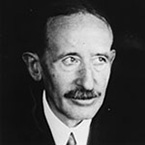
Born on Christmas Day in 1866, James Ewing grew up in a loving, well-to-do household, but he was no stranger to pain. It was said that the deep empathy he had with those who were suffering arose from his own physical and emotional pain: Osteomyelitis at the age of 14 left him permanently lame; trifacial neuralgia and urinary calculosis were companions in later life. The death of his young wife from toxemia of pregnancy after they had been married but three years left sadness as his leitmotif. He became a “scientific recluse,” devoting all his time to teaching and laboratory studies. His misfortunes served to drive his intense interest in alleviating misery by uncovering the mystery of cancer.
Dr. Ewing’s many contributions to cancer research grew out of his curiosity and interest in pathology, which developed in medical school at the College of Physicians and Surgeons of New York (MD, 1891) and as a contract surgeon in the Army during the Spanish-American War. His animal research was supported by the Collis P. Huntington Fund for Cancer Research at Cornell Medical College, where he was the first professor of pathology. He later established, with the financial backing of Dr. James Douglas, the Cancer Center at Memorial Hospital in New York, so he could treat humans. There he experimented with immunotherapy and chemotherapy and determined the possibilities and limitations of x-ray and radium therapy in treating cancer.
In 1920, Dr. Ewing identified the eponymous malignant bone tumor he at first thought was an “endothelioma of bone,” believing it arose from the blood vessels of bone tissue. He later described Ewing’s sarcoma as an endothelial myeloma, distinctly separate from lymphoma or neuroblastoma.
Dr. Ewing served as AACR’s first president (1907, 1908), was treasurer in 1913, and president again in 1937. He was on the editorial board of the Journal of Cancer Research, which preceded Cancer Research. He maintained cancer was not a single disease but many diseases covering a broad area of biology and a universal potentiality of tissue cells. He also believed in educating the public about the early signs and symptoms of cancer. Dr. Ewing wrote one of the classic medical textbooks, Neoplastic Diseases (Philadelphia, W. B. Saunders, 1919).
At the age of 76, Dr. Ewing succumbed to the disease he had studied all his life. He himself made the microscopic diagnosis of his own incurable bladder cancer.